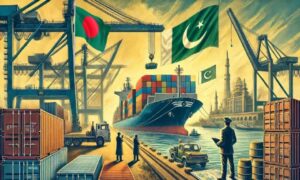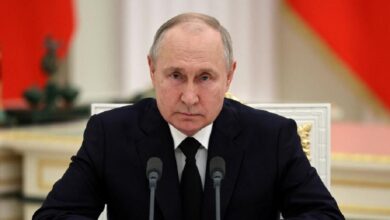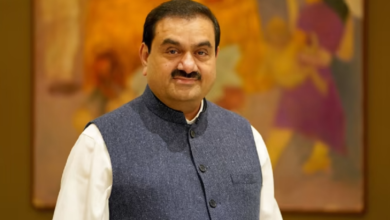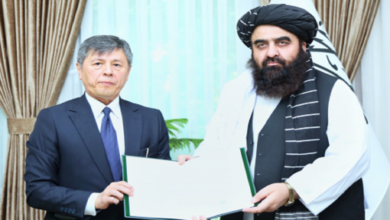Why is India concerned about Pakistani ships coming to Bangladesh?
For the first time since the 1971 war of independence, a cargo ship has come directly from Pakistan to Bangladesh. India has expressed deep security concerns in this situation.
Indian media outlet Telegraph India reported this information in a report on Friday (November 15).
The report said that direct maritime connectivity between the two neighboring countries in India’s east and west is likely to create potential instability in the country’s northeastern states (Seven Sisters).
A cargo ship from Karachi anchored at Chittagong port last Wednesday (November 13). Pakistan’s High Commissioner to Bangladesh Syed Ahmed Maruf called the direct shipping route a major step towards strengthening bilateral trade and business relations between Bangladesh and Pakistan as well as strengthening a more integrated and trade network in the region.
The Pakistani High Commissioner said that this direct route is expected to simplify the supply chain and reduce the time for transporting goods. The ship, which has a capacity of about 2,300 (twenty-foot equivalent units or 20-foot-long containers), is carrying a variety of goods. This reflects the growing demand for direct trade between the two countries.
After Sheikh Hasina was ousted from power in Bangladesh in August amid student protests, the new interim government leadership welcomed the direct sea link with Pakistan.
Indian media reports claim that the interim government that came to power after Sheikh Hasina’s fall is keen to increase trade with Pakistan. And they hope that trade between the two countries will increase through direct sea routes. In 2023, the trade volume between Bangladesh and Pakistan was less than $800 million.
A source told the media, “Chittagong and Mongla are the two main ports of Bangladesh. Pakistan has not found a place here in the last five decades. Trade between the two countries used to go through Singapore and Colombo. But now Pakistani ships will come directly to Chittagong port. You cannot say that banned goods (weapons) will not come to Chittagong from Pakistan. And they will not fall into the hands of armed groups.’
Referring to the 2004 arms seizure, the report said that Pakistan’s intelligence agency had sent 1,500 Chinese weapons to the Assam separatist group ULFA in a trawler. But they were seized before they could reach ULFA.
The Telegraph India report said that India used former Prime Minister Sheikh Hasina to keep China away from these two Bangladeshi ports.
An Indian security source said, ‘Last year, India won a strategic victory over China by getting the responsibility of operating the Mongla Port terminal. But now Pakistan has got the opportunity to use the Chittagong port. This will definitely have an impact on the geopolitics of the region. Because Myanmar is also very close to Chittagong.’
The Telegraph India says that the situation in Myanmar is now turbulent. India fears that illegal infiltration and drug trafficking from Myanmar to India may increase.
The report did not cite any official source in Bangladesh. However, this is seen as a major step in increasing trade and business relations between the two Muslim-majority countries.
According to a report by the British media Independent, the docking of Pakistani cargo ships in Bangladeshi ports is a symbol of historic change. It marks a new beginning for the traditionally complex diplomatic relations between Pakistan and Bangladesh. This warming has begun under the leadership of the new interim government after the ouster of Sheikh Hasina’s government.
In 1971, independent Bangladesh emerged from Pakistan through a bloody war. This nine-month conflict resulted in widespread killings. This has long affected the relations between Dhaka and Islamabad.
Sheikh Hasina’s father, Sheikh Mujibur Rahman, took office as the first Prime Minister of Bangladesh after independence. Finally, on August 5, the Sheikh Hasina government was overthrown by a student-public movement. After that, she moved to India. After Sheikh Hasina was overthrown, pictures and sculptures of Sheikh Mujib were removed.
After the fall of the Sheikh Hasina government, both Islamabad and Dhaka expressed interest in warming and normalizing relations. Last September, the head of the interim government, Dr. Muhammad Yunus and Pakistani Prime Minister Shahbaz Sharif met on the sidelines of the United Nations General Assembly in New York, where they called for the resumption of cooperation between the two countries.





